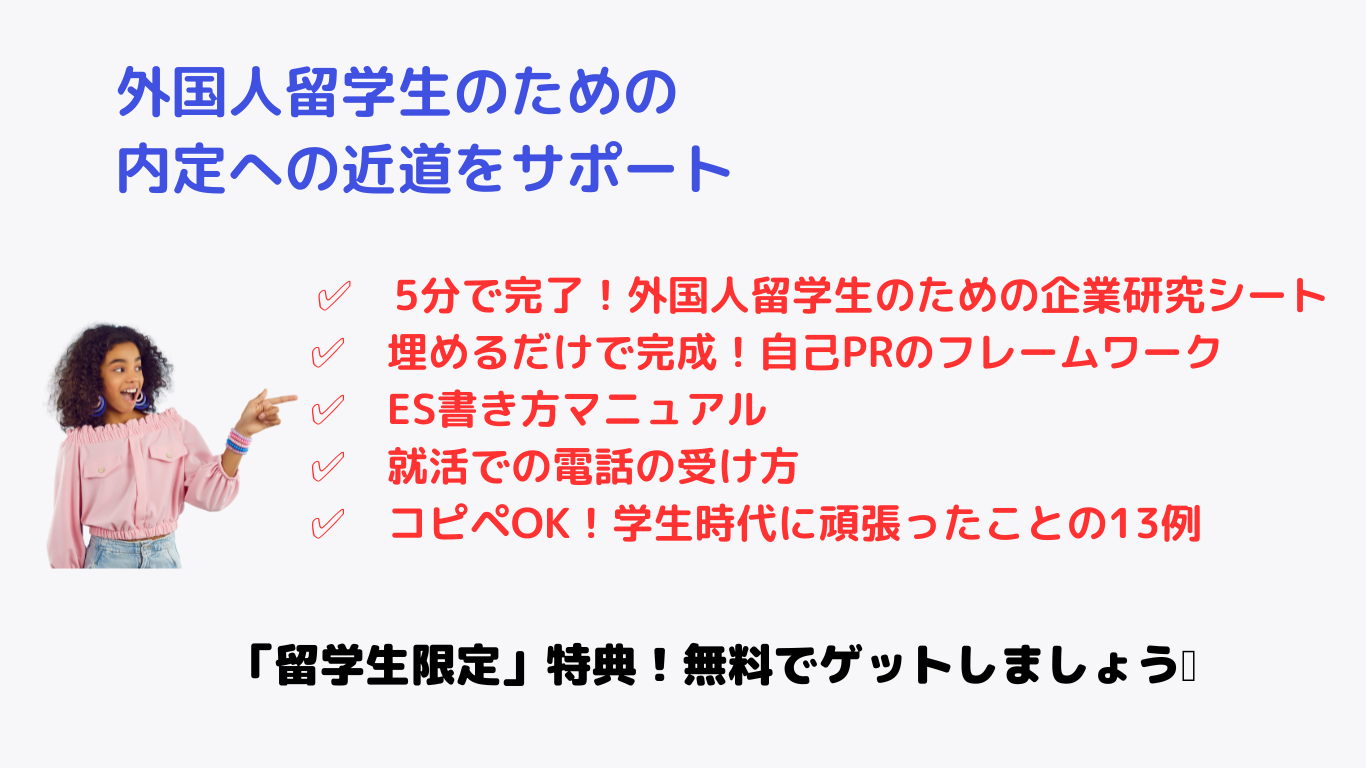After completing my master’s degree, I decided to find a job in Japan instead of returning to my home country.
I started job hunting in earnest in March and had interviews with about 50 companies through many job hunting services.
Until June, I was always failing at interviews, but in July I received job offers from three companies.
I am delivering information on job hunting based on my experience of finding a job as an international student and career advisor.


就活ナビ
In this article, we will introduce one of the most frequently asked questions in an interview: how to Introduce yourself in Japanese.
1. why are you asked to “self-introduction”(Jikoshokai) in an interview?
Reason 1: To learn about students’ personalities and characteristics.
The first reason why “self-introduction” is asked in an interview is to learn about the student’s personality and characteristics.
Interviewers ask for self-introductions in order to learn “what kind of person the student is.
Therefore, through self-introduction, you should briefly introduce “what kind of person you are” to the interviewer.
Reason 2: To check Japanese level
The second reason why “self-introduction” is asked in an interview is to check the Japanese level of the international student.
The interviewer is checking to see if you can communicate yourself clearly in Japanese.
To make a good impression on the interviewer, practice your self-introduction in Japanese.
2. Points to convey in self-introduction
Point 1: Provide basic information
The first point to convey in self-introduction is basic information.
In self-introductions, first give basic information such as your name, university, faculty, and hometown.
For example, 私は〇〇大学〇〇学部の〇〇と申します。〇〇年、〇〇国から来ました。
Point 2: Communicate experience and characteristics
The second point to convey in self-introduction is experience and characteristics.
By conveying experiences and characteristics such as hobbies, study abroad experience, part-time jobs, and things you are good at in your self-introduction, you can show what you want to do and your personality.
In order for the interviewer to take an interest in you, tell them where you match the kind of person you want to hire.
For example, 学業以外アパレ販売のアルバイトをしてきました。販売員としてお客様のニーズを把握し、提案することを意識しています。また、売上目標を達成した時はやりがいを感じます。これからも社会人として働く上で、目標に向けて行動できる営業マンになりたいと考えております。」のように伝えましょう。
Point 3: Words of thanks
The third point to convey in your self-introduction is a word of thanks.
At the end of your self-introduction, say, 本日はお忙しい中、お時間をいただきまして、誠にありがとうございます。
3.Examples of self-introductions
Case 1: “Part-time work experience”
〇〇大学〇〇学部〇〇学科の✖️✖️✖️と申します。出身地は〇〇です。〇〇年、留学生として来日しました。
学業以外アパレ販売のアルバイトをしてきました。
販売員としてお客様のニーズを把握し、提案することを意識しています。また、お客様に感謝される時は大変喜びを感じます。
これからも社会人として働く上で、お客様が喜んでくる商品を提案できる営業マンになりたいと考えております。
本日はお時間を頂きまして、誠にありがとうございます。宜しくお願い致します。
Case 2: “Hobbies
〇〇大学〇〇学部〇〇学科の✖️✖️✖️と申します。〇〇年、〇〇国から来日しました。
趣味はキャンプです。夏休みや週末、キャンプに行っています。自然の中で本を読んだり、料理をしたりして楽しんでいます。
また、キャンプをより楽しめる知識やスキルを学ぶために、キャンプインストラクターという資格を取りたいと考えています。
社会人として働く上でも、熱意を持って業務に取り組みたいです。
本日はお忙しいところお時間を頂きまして、誠にありがとうございます。宜しくお願い致します。
Example 3: Study Abroad Experience
〇〇大学〇〇学部の〇〇です。出身地は〇〇です。
母国で高校を卒業した後、新しい環境に適応できるようになりたいと思い、日本に留学して来ました。
母国と文化や考え方が違う日本で生活や勉強することで、日本語能力だけではなく、異文化適応力を身につけました。
社会人になってからも留学の経験を活かして、多様なバックグラウンドを持つ人々と協力して働きたいと考えております。
本日はお忙しい中、お時間を頂きまして、誠にありがとうございます。宜しくお願い致します。
4. What to avoid during an introduction
Note 1: Do not introduce yourself too long
The first thing to keep in mind when introducing yourself is not to introduce yourself too long.
You may talk for a long time because you want to show the interviewer a lot about yourself.
However, if you talk too much in your self-introduction, the interviewer will get tired of listening to it halfway through.
So, be aware of the time you have to speak so that your self-introduction is not too long.
Note 2: Self-introduction is not self-promotion(JIKO-PR)
The second thing to keep in mind when introducing yourself is not to confuse this with self-promotion.
Many students use self-introductions to highlight their strengths.
However, self-introduction and self-promotion are two different things.
If you answer the content of your self-promotion in your self-introduction, the interviewer may judge that you do not understand the meaning of the question.
Be careful not to confuse self-introduction and self-presentation.
Note 3: Speak clearly and cheerfully
The third thing to keep in mind when introducing yourself is to speak clearly.
If you speak in a listless, rambling manner when introducing yourself, you are not making a good first impression on the interviewer.
If you do not make a good first impression, the interviewer will not be interested in you.
Therefore, introduce yourself with a smile and speak briskly.
Finally
To all international students, the most important factor when seeking employment in Japan is mastering the Japanese language. Smooth communication in Japan’s workplace environment and society relies on using the right words to express yourself effectively. Furthermore, having strong Japanese language skills provides advantages in various situations, from selecting job opportunities to interviews and actual job tasks. By enhancing your Japanese language proficiency, you can approach your work with confidence.
offers a solution to the language barrier faced by international students during job hunting by providing a free Japanese conversation room exclusively for foreign students. If you’re interested in learning Japanese, we encourage you to join us. Please feel free to participate!


